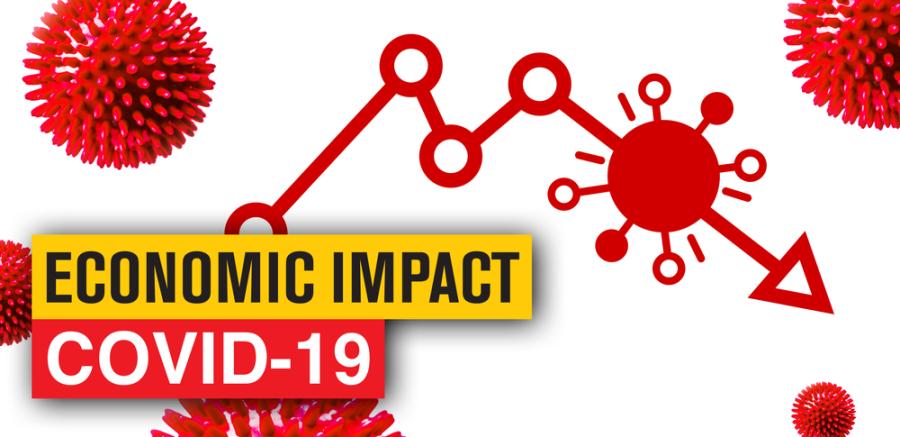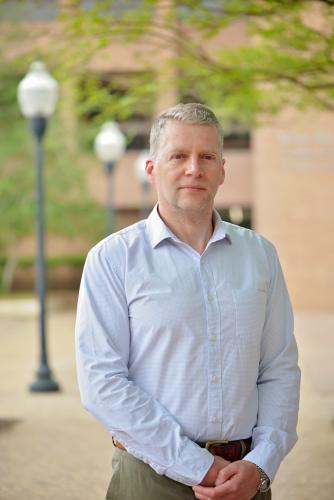NACOGDOCHES, Texas — In higher education, much emphasis is placed on transformative learning experiences. In fact, when administrators at Stephen F. Austin State University were drafting the university’s 2015-23 strategic plan, they assigned providing students with transformative learning experiences as the institution’s overarching goal.
Generally, these types of experiences are gained through internships, work study and study abroad activities in which students voluntarily participate. They provide the types of hands-on learning opportunities that help students acclimate to the world and their careers after graduation.
Recently, just about every college student worldwide has become actively engaged in a transformative learning experience as a result of the effects of COVID-19. Though there are many lessons to be learned from this pandemic, the lessons involving economics will be especially far reaching.
“Every person on the planet is making adjustments,” said Dr. Mikhail Kouliavtsev, department chair and professor of economics at SFA. “The uncertainty created by the virus is having a cross-cut influence on all sectors of the economy, affecting households, businesses and financial markets.”
With an estimated 67 million Americans working in jobs that are labeled as “high risk” for layoffs, Kouliavtsev offered some insight into several aspects of the world crisis, especially as it relates to economics.
Layoffs
Kouliavtsev recommends doing four things if you’ve been laid off.
-
Immediately file for unemployment. Most state unemployment offices are overwhelmed and understaffed, so delays are likely. The sooner you act, the faster you can get in the queue.
-
Talk to your landlord, mortgage lender, utility provider and/or credit card issuer. Many are offering some sort of bill “holiday” to help customers. If not, ask if they will be flexible. You won’t be the only one asking.
-
Focus on keeping everyone in your household healthy. Other expenses can be postponed.
-
Resist the urge to liquidate your retirement account. The penalty for early withdrawal added to the tax liability will eat a substantial chunk of your funds, which will be difficult to rebuild.
Stock market
Kouliavtsev believes the stock market will continue to bounce around as long as there is uncertainty about the pandemic or until we have hit the peak of new infections and deaths from COVID-19, and the health care system can manage the flow of the sick. When we know there are treatments and a vaccine in development, we will have a better idea of the timeline of this crisis, and then the market can begin to stabilize.
Retirement accounts
According to Kouliavtsev, those very near retirement likely already had most of their retirement funds out of the stock market and in something less volatile, like fixed-income bonds, before the crisis hit. For those who did not, postponement of retirement may be necessary to allow fund recovery. Kouliavtsev warns that panicking and selling investments now may have dire consequences, as those who have already lost due to the market plunge will miss the opportunity for fund recovery.
Stimulus package
“It will help, but it also will not be nearly enough,” Kouliavtsev said. “Hopefully, it is a down payment on a much larger investment the government will have to make to help the American people.” For individuals approved to receive the $1,200, Kouliavtsev believes it won’t go very far; especially when the median rent for a one-bedroom apartment in the U.S. is about $1,100, and many people have already been without income for more than a month. Another difficulty Kouliavtsev sees is making the stimulus package work in its intended fashion — to stimulate the economy — when stores, restaurants and service industries are closed, and people are instructed to stay home.
Paying for government spending
Significantly increasing government spending — as this stimulus package requires — without immediately raising taxes will mean running a large budget deficit. While this debt accumulation typically is a major concern for long-term growth, interest rates are at some of the lowest levels in history, practically zero. When taking inflation into account, rates are effectively negative, meaning the government can essentially borrow at no cost. In other words, if there was ever a time for the federal government to spend freely and not worry about the debt it accumulates it’s now. Because of the severity of the pandemic, it is important to focus on the “public” before we worry about “public debt.”
Investing
Kouliavtsev said typically, a significant plunge in the stock market is a good time to invest, if the investment is made with the long term in mind. As far as real estate, mortgage rates are low, and we are headed into summer, which generally signify a favorable time to buy. However, it is not easy to shop for a home due to the actual steps involved in buying — attending open houses, meeting with bankers and real estate professionals, etc., due to social distancing guidelines.
Job growth
Since many people have been in quarantine and isolated with only their computers and the internet to keep them company, Kouliavtsev believes the U.S. will see an increase in tech-related occupations, like coding and data science. He also said it will be interesting to see how health care will be affected. “It was already a sector that needed reforming before the COVID-19 pandemic,” Kouliavtsev said. “But it was primarily the cost of health care and insurance coverage that were the main issues. We are now seeing that having adequate hospital and ICU bed capacity may be just as important, as is staffing, including doctors, nurses and other health care workers. We may see a concerted effort to invest in health care more broadly, and that will expand the job opportunities in these careers.”
Impact on higher education
With most institutions switching to an online instruction format, students are not physically on campus, and therefore there is less revenue being generated from housing, meal plans and fees students pay for things like the use of on-campus computer labs, recreation facilities, library resources, etc. SFA will be refunding approximately $9 million to students for services like these for the 2020 spring semester. This type of revenue loss will hit higher education hard, especially private colleges. Kouliavtsev said there are some bright spots. We typically see higher enrollments in colleges and universities during recessions because scarce employment opportunities during economic downturns make people want to attain skills, certifications and degrees to help improve their employability. And, to the extent students and their families may want to stay close to home in these uncertain times, regional institutions, like SFA, may be in a good position to fulfill their missions — serving the region. SFA, for example, may be an excellent destination for students from the East Texas area who planned to attend college in Austin or College Station, but now want to stay closer to home.
Student adjustment
“I am quite impressed with how our students accepted foregoing their spring break, not being able to participate in study abroad trips in May and summer, and for some, not being able to attend their own commencement ceremony with their families,” Kouliavtsev said. “The transition to online classes is not easy — for students or professors — but it seems everyone understands the circumstances and is trying to make it work.”
Positive outlook
Eventually, things will return to normal — although our day-to-day lives may be forever altered. And as difficult as the past several weeks have been, Kouliavtsev said there are some positives to take away. First, we will have learned a great deal about how to manage a crisis. They don’t come around very often, but pandemics do happen, and we will be better equipped to handle the next public health crisis, know how much and what kinds of stimulus packages are needed, and have a better idea of the timeline involved. Second, some of the personal hygiene habits we have been encouraged to practice — regular and thorough handwashing, covering a cough, being mindful of face touching — may help us reduce the spread of other illnesses, including influenza. This could translate into substantial savings to employers from fewer people missing work, less strain on the health care system and fewer lives lost. Third, people quarantined to their homes are spending more time with their families, cooking and eating together, possibly learning new skills and taking online classes. “There is definite value in all of these activities,” Kouliavtsev said.
 Axe ’Em, Jacks!
Axe ’Em, Jacks!

